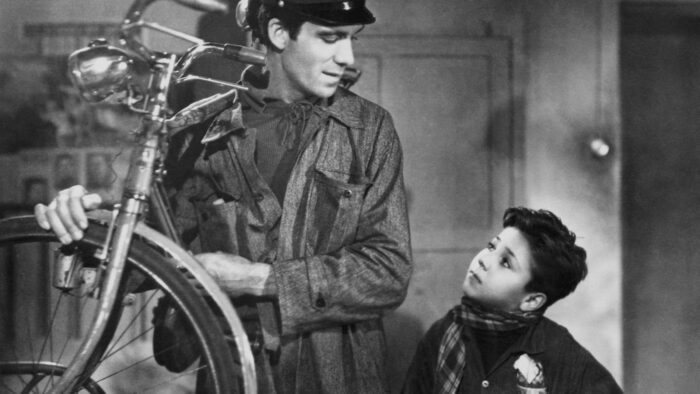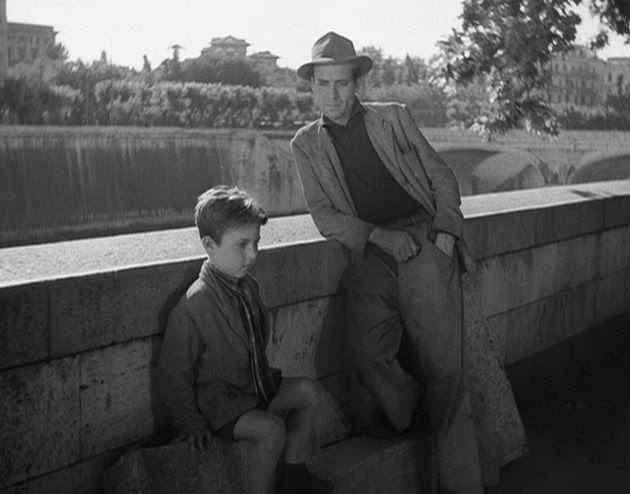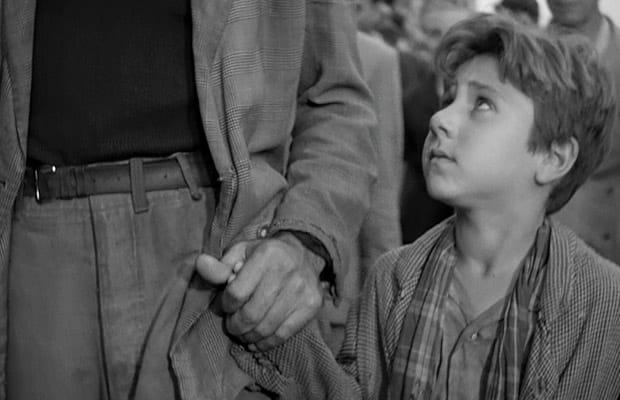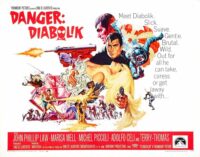During the mid-1940s, a cinematic movement was making an impression throughout the entire world. This week, 25YL stops in Italy to take a look at Italian neorealism and one of the seminal films from that movement, Bicycle Thieves.
Italian neorealism explores existential responsibility, the duty to one’s family, and the difficulties of interpersonal relationships. Characterized by an exploration of the working class, such examples of Italian neorealism include Luchino Visconti’s Ossessione, Roberto Rossellini’s Germany Year Zero, and Federico Fellini’s La Strada, to name just a few. In each of these films, the lives of the working class are captured in explicit detail. Many elements of these films revolve around the unbalanced economic system, the exploitation of the working class, and the lack of adequate social programs and government failings that marginalized those most vulnerable.
Much of this period can be attributed to artists’ response against the dictatorial rule of Benito Mussolini. His fascist administration, in power for 20 years, perpetrated mass xenophobia and aligned himself with Adolf Hitler. Much of the Italian citizenry rallied against him and were happy to see his rule come to an end in 1945. During Mussolini’s decline—and certainly, after he was deposed—Italian filmmakers began to show “Life as it is” for those in Italy. As a statement against the dictatorship that had defined Italy under Mussolini, Italian neorealism emerged capturing the complexity of the Italian working class, the socially-rich family neighborhoods, the street businesses, and the crowds that would descend upon football stadiums—the movement of life.
Inspired by such names as Charles Dickens, Jean Renoir, and King Vidor—along with several other literary and cinematic figures concerned with social issues and the plight of working human beings—the neorealists carved for themselves a place in cinematic history in which actual lived-in humble locations were used to give a voice to the voiceless. Several stylistic elements characterized this goal of telling richly human stories like never before. Some of the characteristics of Italian neorealist films include location filming that allowed the camera to get close to the people in the world enhancing the realism, illustrating the lives of the working class who are often experiencing a crisis pertaining to their financial place, and a focus on the masses and the need for reform. In an attempt to allow the camera freedom to roam, Italian neorealists avoided a reliance on editing, instead opting for more opportunity for raw human emotion to be captured on film. Another common facet of Italian neorealism, utilized in the 1948 film by Vittorio De Sica Bicycle Thieves, was the use of untrained actors for lead roles in the film. The father and son that carry the plot in Bicycle Thieves were not trained performers, and rather, were cast by De Sica due to their looks as average members of the Italian working class. Such casting rejected the stardom and glamor of acting, especially the Hollywood studio system, and returned focus to the masses that would be watching the film.
“I’ve been cursed since the day I was born.” Antonio Ricci utters this devastating phrase to his wife when he is lamenting over the difficulties in his procurement of a job in post-war Italy. Every day he waits in line to see if the day will finally come in which his name will be called granting him a job. Crowds of people wait alongside Antonio, with the desperation as apparent on their face as the longing in their eyes to feel serviceable again. Work is so ingrained in the human consciousness in association to usefulness that each passing day wherein Antonio’s name is not called for a job, his human spirit drastically deflates. When his name finally is called, Antonio is thrilled to take a job hanging posters; the one condition of employment is that Antonio has a bicycle. This stipulation presents a problem for Antonio, as he previously pawned his bicycle to get money to pay for food for his wife and son. Coming up with the money to get his bicycle out of pawn puts a damper on his excitement over finding work. In a desperate attempt to save her husband’s spirit and to help their family overcome their hardships, Antonio’s wife Maria prepares their sheets to take to the pawn shop. The plan works, and the bicycle can be taken out of pawn with enough left over that the family has some money to live on until Antonio begins receiving the handsome salary of his new job.

Getting dressed for work the next day, Antonio is as vital and purposeful as we have seen him through the entire film. Antonio feels worthy of a place in the world as a working member of society. Just as he gleefully begins work hanging posters around the city, Antonio’s bicycle is stolen. A calculated effort of a pair of thieves led Antonio astray as he attempted to chase down the person who took his bicycle. Desperation overcomes him, and every sense of self-worth we just saw restored within Antonio is gone again. His sense of purpose, his pride, and his livelihood were taken with the theft of Antonio’s bike.
Along with some family friends, and his son Bruno, Antonio begins to scour the city looking for his bicycle. They check pawn shops, they check markets where parts of stolen bicycles are frequently taken to make money, they check the crowded streets and pathways, all to no avail. Antonio’s laser-focus on retrieving his property and his constant swimming in his thoughts as he worries about his family’s well-being cause him to lose sight of the fact that his son is with him and absorbing his father’s disposition like a sponge. Bruno looks up to his father, and it is inconsequential to him whether he works or not. To Bruno, Antonio’s self-worth is not attached to his employment. The father and son quest to find the stolen bicycle looks very different depending on whose perspective you are viewing the journey through. For Antonio, he wants to get back the means to financially support his family; but for Bruno, he wants to be closer to his father. In one crucial way, the journey is the same for both of them, as they are both subconsciously searching for validation from each other. Bruno wants to feel worthy of his father, to impress him by helping him, and to spend time with him. Their bond grows as hope wanes, and Antonio falls deeper into desperation.

Perhaps one of the most heartbreaking scenes in the history of cinema takes place in Bicycle Thieves. In desperate need of escapism and to feel close to his son, Antonio takes a hungry Bruno to an upscale cafe for lunch. Antonio knows he has mistreated and neglected his son throughout his time out of work and in their pursuit of his bicycle. He lashed out at Bruno, making the young boy cry, and wants so badly to make it up to him by giving him something which he has never before been able to provide. With the money remaining after pawning the family’s sheets, Antonio decides its best use at that moment is to share an experience with his son. Wise beyond his years, Bruno can look around at the clientele and menu options and know he doesn’t belong here. He sees boys sneer at him, he sees people dressed in better clothes than him, and he sees food plates bigger than he has ever seen before. Antonio is dancing along to the live band acting jovial as he orders food desperately trying to convince his son, and himself, that he has their troubling situation under control. The facade cracks as a wave of depression washes over Antonio, and he admits to himself and Bruno that the job he had secured is probably out of his grasp. This happy moment filled with music, food, and family is only temporary, and all of Antonio’s problems will still exist after his plate is empty.
The attempt to find his bicycle leads Antonio to a man who he believes is the culprit. Antonio chases the man to his home, vilifies him, and makes a scene in the street threatening to call the police. When the police arrive, Antonio is taken into the man’s home to search for the bicycle he wholeheartedly believes he will find there. The bicycle isn’t there, and the audience is shown that the man that Antonio has ridiculed and belittled believing him to be a thief, is not unlike him. The accused man lives modestly like Antonio, in a low-income neighborhood, and is part of a tight-knit community of people who look out for one another similar to Antonio’s neighborhood. This scene acts as a critical portrayal of the hardships of the working class Italian communities in the mid-1940s. As the day winds down, Antonio grows increasingly desperate, knowing that if the bicycle doesn’t turn up today, all hope is lost that he will ever get it back. After looking longingly at a row of bicycles down one street and an abandoned bicycle down another street, the audience enters the mind of Antonio and realizes that he is considering becoming everything against which he’s rallied. When he sends Bruno home ahead of him, we know his decision has been made.
Antonio is immediately stopped after attempting to ride off on the lone bicycle in the street by the owner and those that live around him that are unwilling to watch Antonio do wrong by their neighbor. Bruno runs toward Antonio crying, unable to believe that which he has just seen—his father become a thief. Bruno pleads with his father, begging to know why he decided to steal when the owner of the bicycle decides not to press charges. The fate of walking home to explain to his wife that his bicycle was stolen after his son was witness to his momentary lapse of morality, feeling defeated by the city and the government that was supposed to uphold him, is a fate worse than prison for Antonio.

Bicycle Thieves is a film that breathes. It is alive with the people and places that make up Italy, allowing the audience to feel as though they are on the streets next to Antonio and Bruno. More than a tale of morality and ethics, Bicycle Thieves is also a film that explores the human spirit, and just how much it can be broken down by the weight of the world and expectations placed upon it. “There is a cure for everything except death.” This statement uttered by Antonio is packed with what’s not being said. What does death mean to a human spirit? Antonio felt useless and unworthy to his family at the prospect of losing the job he was lucky to receive. Antonio was alive while he was searching for his stolen bicycle, but his spirit was on life support. The only cure Antonio could see for himself was to become what he despised because at least then he would have the means to become something different. When someone starts out in life so far behind the eight-ball, it’s easy for desperation to kick-in and actions that an individual wouldn’t think of doing become their only choice.
Bicycle Thieves is a beautiful film to view and explore the capacity for empathy by studying a character so wronged by the system under which they live. The dynamic between a father and a son and the comradery of two people with a shared goal is yet another thing Bicycle Thieves has going for it. Relationships are tested under harsh circumstances, and the devotion Antonio and Bruno share toward each other is so beautifully palpable. The power of love and the depth of sacrifice is vividly on display throughout the film, serving as another much-needed reminder that we’re all in this together.



Such a great film. The final scene, when Antonio cries and Bruno takes hi hand, gets to me every time. Sometimes I am in tears at the end. When Antonio sobs,so do I